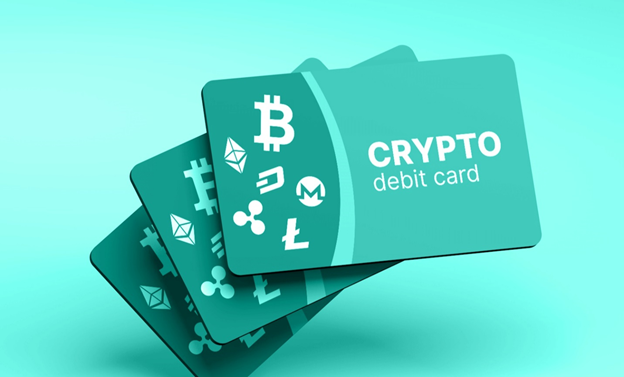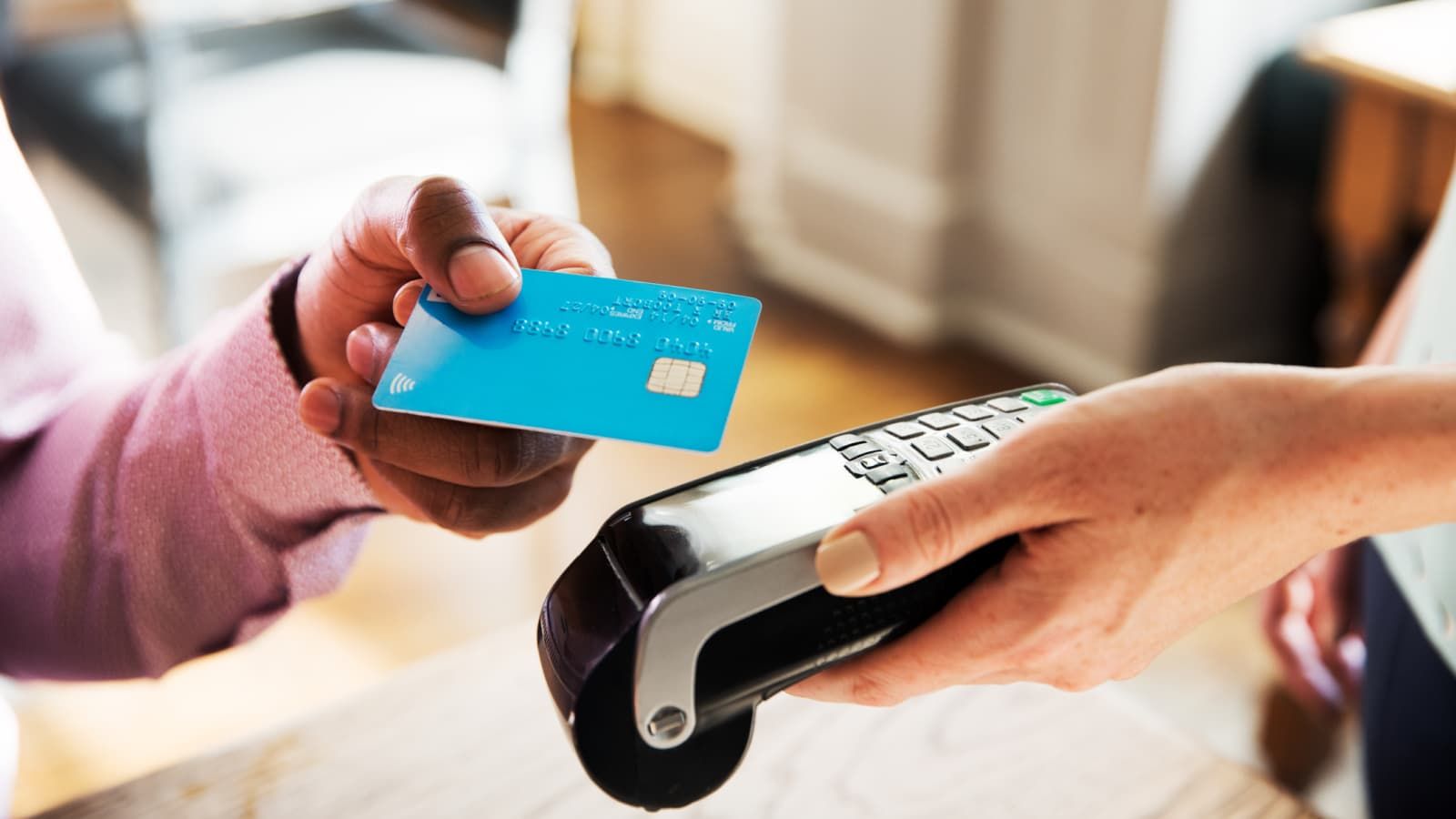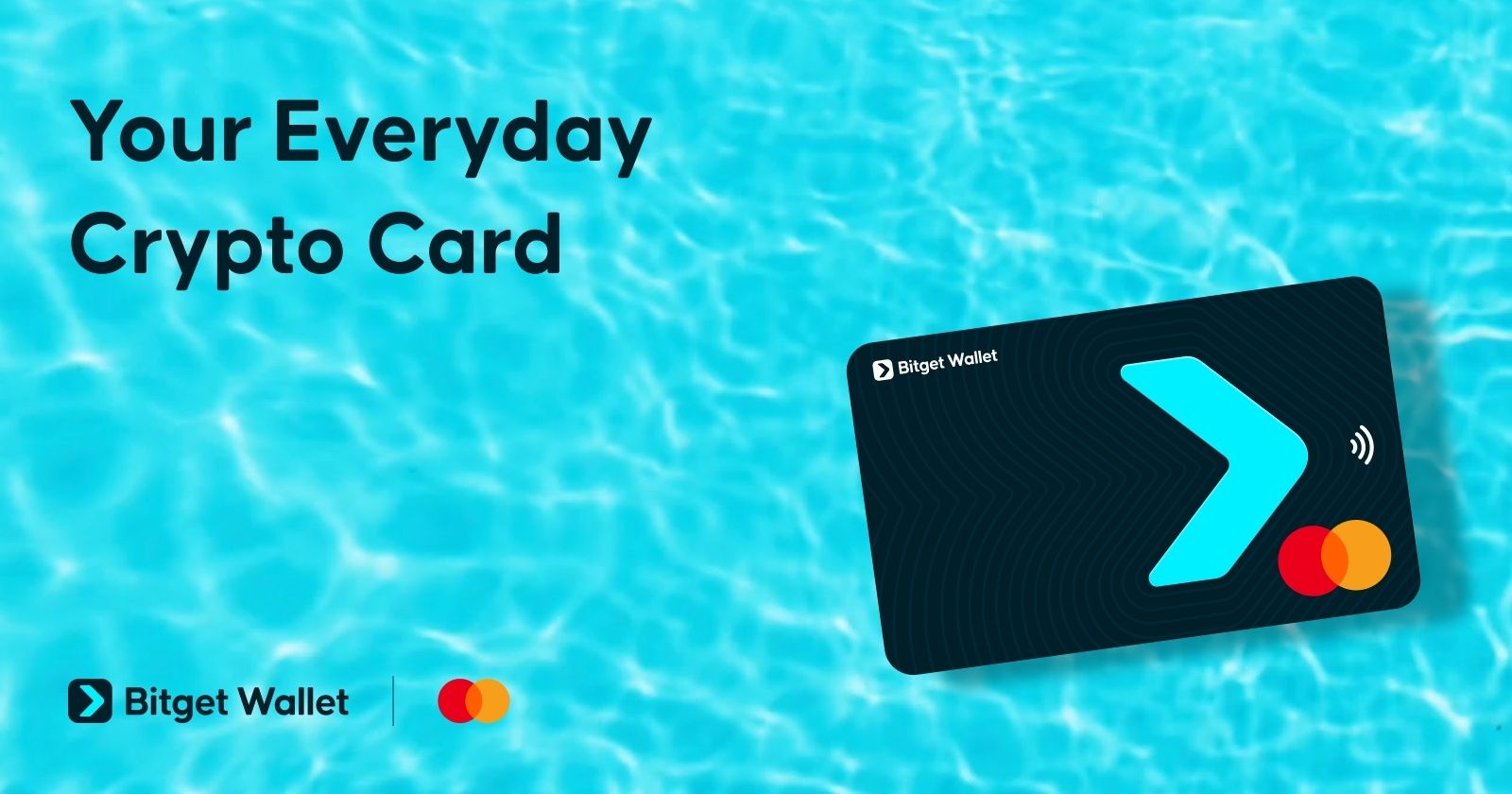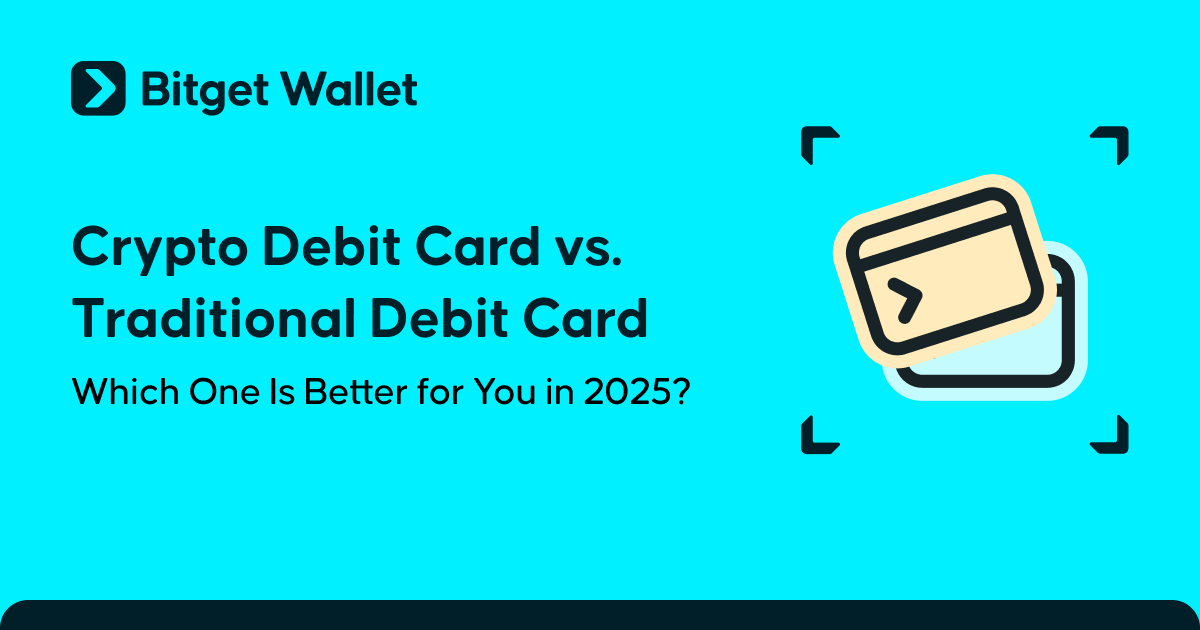Crypto Debit Card vs. Traditional Debit Card: Which One Is Better for You in 2025?
Crypto Debit Card vs. Traditional Debit Card is a question many modern users face when choosing how to manage their daily spending. Both payment methods offer distinct advantages for different user needs:
- Crypto debit cards convert digital assets into spendable currency at checkout.
- Traditional debit cards withdraw money directly from your bank account.
People who want better rewards and crypto integration often choose crypto cards. Those who value security and predictable buying power usually pick traditional cards with proven fraud safety and wide merchant acceptance. For newcomers exploring crypto payments, Bitget Wallet Card offers seamless global spending with beginner-friendly setup and multi-chain support.
Understanding the underlying distinctions allows you to make an educated selection that is consistent with your financial habits and risk tolerance. This article lays down the important distinctions to help you determine which one best suits your lifestyle and financial requirements in 2025.
Key Takeaways
- Crypto debit cards are digital asset spending solutions that automatically convert your cryptocurrency holdings into conventional cash whenever you make purchases at shops.
- Traditional debit cards act as direct links to your bank account money, taking out deposited money right away without any currency exchange or borrowing systems.
- The core difference comes down to funding sources: crypto cards use volatile digital asset portfolios while traditional cards tap into stable bank account balances.
What Is a Crypto Debit Card and How Does It Work?
A crypto debit card is a way to pay that lets people use their cryptocurrency to buy things at stores that accept regular credit and debit cards. These cards function by converting digital assets into fiat currency at the moment of transaction.
How does a crypto debit card convert funds at the point of sale?
The conversion process happens instantly through real-time market mechanisms.
- User initiates payment at merchant using a crypto debit card.
- Card provider sells required crypto amounts at the current spot market rate.
- Merchant receives payment in local fiat currency via traditional payment rails.
- The equivalent crypto amount gets deducted from the user's connected wallet or exchange account.
Which payment networks support crypto cards today?
Major payment networks have embraced crypto card technology for global merchant acceptance.
-
Visa:
Supports crypto debit cards with access to over 100 million merchants worldwide across 180+ countries, enabling seamless transactions at any Visa-enabled terminal.
-
Mastercard:
Powers crypto payment solutions with global merchant network coverage, providing instant settlement in local currencies while maintaining traditional payment security standards.
What types of cryptocurrencies can you use with these cards?
Modern crypto cards support various digital asset categories to meet different user preferences.
-
Bitcoin (BTC):
The original cryptocurrency accepted by most crypto debit card providers, offering direct spending capability for the world's largest digital asset.
-
Ethereum (ETH):
Second-largest cryptocurrency by market cap, widely supported across crypto card platforms for everyday transactions and merchant payments.
-
Stablecoins (USDT, USDC):
Dollar-pegged cryptocurrencies providing price stability, ideal for users wanting crypto card benefits without market volatility exposure.
Read more: What Is a Crypto Debit Card and How Does It Work?

Source: Millionero Blog
What Is a Traditional Debit Card and How Does It Function?
A traditional debit card is a payment method that is linked to a bank's checking or savings accounts. When you make a purchase, funds are withdrawn directly from your current account balance, with no borrowing capabilities.
How do traditional debit cards process payments?
Traditional debit cards process transactions through direct account access mechanisms. Each point-of-sale or online transaction immediately debits funds already deposited in your bank account, eliminating borrowing or interest charges.
These payment tools work using major banking networks like Visa, Mastercard, and UnionPay. Such networks offer almost universal store approval worldwide, along with full ATM access for cash withdrawals with different cost plans.
What types of traditional debit cards exist?
Banks offer several debit card variants to meet different customer banking needs.
-
Standard Debit Cards:
Basic cards linked to checking accounts with fundamental payment and ATM withdrawal capabilities, typically featuring EMV chip technology for enhanced security.
-
Rewards Debit Cards:
Enhanced cards offering limited cashback programs ranging from 0.5% to 2% on specific purchase categories, though rewards remain less generous than credit alternatives.
-
Prepaid Debit Cards:
Pre-loaded cards requiring upfront funding before use, providing budget control without requiring traditional bank account relationships or credit checks.
How secure are traditional debit cards for online and offline use?
Traditional debit cards benefit from established fraud protection frameworks with federal liability limits. Federal rules limit theft losses to $50 when you report problems within 60 days after getting your bank papers.
Current safety tools include EMV chip technology, which have cut fraud by 75% at stores using chip readers. Banks use smart fraud detection systems that track spending habits and offer quick account blocking tools when strange purchases happen.

Source: CNBC
What Are the Key Differences Between Crypto and Traditional Debit Cards?
Understanding these fundamental differences helps consumers make informed decisions based on their financial needs and preferences.
1. Currency Source: Crypto Wallet vs. Bank Account
Crypto debit cards link straight to crypto wallets or exchange accounts, letting people spend virtual money like Bitcoin, Ethereum, and stablecoins. These cards convert crypto into fiat currency right away using current market rates for every purchase.
Traditional debit cards link exclusively to bank checking or savings accounts containing fiat currency. Funds are immediately deducted from your existing account balance without any currency conversion process required.
2. Volatility and Rewards
Crypto debit cards expose users to crypto market swings, making purchasing power change a lot from day to day. Yet top crypto cards provide superior cashback rates between 1% and 10% in cryptocurrency rewards.
Traditional debit cards provide predictable purchasing power with stable fiat currencies. Their reward programs typically offer limited cashback between 0.5% to 2% on specific purchase categories, though these rewards remain less generous than crypto alternatives.
3. Fees and Accessibility
Between traditional debit vs crypto card fees, the latter option generally has higher fee structures, including crypto-to-fiat conversion fees of 0.5% to 2%, plus potential monthly maintenance and top-up charges. However, they often provide lower foreign transaction fees for international spending.
Traditional debit cards often avoid issuance fees but can include monthly account maintenance fees, out-of-network ATM charges, and overseas surcharges that run from 2.5% to 3.5% for international purchases.
Crypto Debit Cards vs. Traditional Debit Cards
This table highlights the essential differences between both payment methods for easy reference.
| Feature | Crypto Debit Cards | Traditional Debit Cards |
| Currency Source | Digital assets in crypto wallets | Bank deposits in checking accounts |
| Rewards | 1-10% crypto cashback, DeFi yields | 0.5-2% limited cashback programs |
| Volatility | Subject to crypto market fluctuations | Stable fiat currency purchasing power |
| International Fees | Lower foreign transaction costs | Higher foreign exchange surcharges |
| Accessibility | Requires crypto knowledge | Widely available with deposit insurance |
Should I Use a Crypto Debit Card or a Traditional Debit Card?
The choice depends on your specific spending patterns, risk tolerance, and financial goals.
1. Use a Traditional Debit Card
Traditional debit cards excel in situations requiring stability and established consumer protections.
-
Everyday domestic spending:
Avoid capital gains tax calculations on every purchase while enjoying predictable purchasing power for routine expenses like groceries and utilities.
-
Budget management priority:
Immediate fund deduction from your bank account makes expense tracking straightforward, helping newcomers and teens manage spending effectively.
-
Maximum merchant acceptance:
Universal acceptance at local businesses and regions where crypto payment infrastructure remains limited, ensuring reliable payment access everywhere.
2. Use a Crypto Debit Card
Crypto debit cards provide advantages for internationally active users and crypto enthusiasts.
-
Global travel and shopping:
Real-time foreign exchange conversion with lower fees often under 1% beats traditional bank foreign transaction surcharges of 2.5% to 3.5%.
-
Active crypto portfolio management:
Seamless integration allows spending directly from digital asset holdings while earning up to 10% cashback in cryptocurrency rewards.
-
Higher reward potential:
Leading crypto cards offer superior cashback rates and DeFi yield opportunities like Bitget's 8% APY on stablecoin balances.
Start spending your digital assets globally with Bitget Wallet Card, designed for beginners seeking seamless crypto-to-fiat conversion.
Can You Use Both Cards Together for Maximum Benefit?
Many users successfully employ a hybrid strategy that combines both card types. Crypto cards cover trip expenses, big tech purchases, and international transactions where their lower costs give clear benefits.
Traditional debit cards handle local bills, rent payments, and daily buys that need ACH transfers or direct debit processing. This method gets the most from each card's good points while minimizing exposure to their respective limitations.
Why Is Bitget Wallet the Best Tool to Manage Both Card Types?
Bitget Wallet stands out as a comprehensive solution for managing both traditional and crypto payment methods.
How does Bitget Wallet support crypto debit card integration?
The platform offers seamless crypto debit card functionality through multiple channels.
-
Multi-chain compatibility:
Supports over 130 blockchains and 1 million+ tokens for flexible card funding across different digital assets.
-
Real-time conversion:
Provides instant crypto-to-fiat conversion with competitive exchange rates and minimal conversion fees at point of sale.
-
Mastercard integration:
Offers global acceptance at 100 million merchants through established payment network partnerships and infrastructure.
-
No-fee structure:
Eliminates annual fees and top-up requirements while maintaining competitive transaction costs for users.
Can you track real-time balances and transaction history?
Bitget Wallet provides comprehensive transaction monitoring through its integrated dashboard. Users can view real-time balance updates across all supported cryptocurrencies and track complete transaction histories with detailed analytics.
The platform includes advanced portfolio tracking features that display spending patterns, conversion rates, and yield earnings from DeFi integrations. Transaction alerts and notifications ensure users maintain full visibility over their crypto debit card activities and account balances.

Why Bitget Wallet Card Stands Out?
Among the many options available in the crypto card space, the Bitget Wallet Card distinguishes itself through its legal infrastructure, seamless wallet integration, and highly competitive fee model. Unlike most crypto cards that act as third-party extensions, Bitget's solution is directly backed by its wallet ecosystem — allowing users to enjoy smoother KYC, native crypto-to-fiat conversion, and a host of financial perks.
Here’s why the Bitget Wallet Card is one of the most compelling choices :
✅ Sign Up, Verify, Earn: Complete KYC and get $5 cashback, no strings attached.
✅ Extra financial perks: Enjoy up to 8% APY on staked stablecoins (region-based), plus cashback bonuses during the first 30 days.
✅ Lowest fees on the market: Only 1.7% comprehensive fee, compared to 2–3% for most competitors, with zero top-up or monthly charges.
✅ Legally issued: Through official Mastercard in the EU and Visa in Asia, making it one of the few truly licensed cross-region crypto cards.
✅ Seamless payment experience: Integrated with Google Pay and Apple Pay, enabling NFC tap-to-pay at any Mastercard/Visa terminal.
✅ Native crypto-to-fiat conversion: Instantly converts crypto at the moment of transaction, removing manual steps or delays.
👉 Ready to experience the future of crypto payments?
Get started with the Bitget Wallet Card today and enjoy low fees, instant crypto-to-fiat spending, and exclusive rewards — all backed by a trusted Web3 wallet.
🔗 Download Bitget Wallet and apply in minutes.
Conclusion
Crypto Debit Card vs. Traditional Debit Card represents a fundamental choice between innovation and stability in modern payment systems. Each option serves distinct financial needs and user preferences in the evolving digital economy.
-
Traditional debit cards:
Offer predictable purchasing power, established fraud protection, and universal merchant acceptance for everyday spending needs.
-
Crypto debit cards:
Provide higher reward potential, lower foreign transaction fees, and seamless integration with digital asset portfolios.
Experience seamless crypto payments and multi-chain trading with Bitget Wallet Card, combining beginner-friendly design with advanced crypto capabilities.
FAQs
1. What is the main difference between crypto and traditional debit cards?
Traditional debit cards take money straight from your bank account, while crypto cards change cryptocurrency into fiat currency when you make purchases.
2. Are crypto debit cards safe to use for daily spending?
Crypto debit cards are safe for daily use because they include standard safety tools like EMV chips and fraud protection from major payment companies.
3. Can I earn rewards with both card types?
Traditional debit cards give small cashback amounts, but crypto cards usually offer better rewards and staking benefits.
Risk Disclosure
Please be aware that cryptocurrency trading involves high market risk. Bitget Wallet is not responsible for any trading losses incurred. Always perform your own research and trade responsibly.
- How to Apply for a Crypto Mastercard2026-01-05 | 5 mins
- How to Apply for a Crypto Visa Card and Start Spending Crypto Worldwide2026-01-02 | 5 mins
- How to Top Up Your Crypto Debit Card with USDT2025-12-29 | 5mins


















